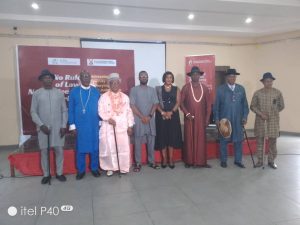The Socio-Economic Rights and Accountability Project SERAP, has held an interactive session on strengthening stakeholders’ capacity to enforce court judgements in Nigeria.
SERAP is a non-profit, nonpartisan, legal and advocacy organization devoted to promoting transparency, accountability and respect for socio-economic rights in Nigeria.
The event which was held at Casoni Hotel, in Port Harcourt, on Thursday, November 7, 2024, featured goodwill messages from the National Human Rights Commission and the Federal Ministry of Justice.
Other activities were media moment, paper presentation by Dr. C.A.J Chinwo, inauguration of volunteer lawyers, interactive sessions and others.
Related Post
- Intimidating Nunieh won’t resolve concerns about corruption at NDDC – SERAP
- Reject any Rivers case assigned to Justice Lifu’s court, residents tell Fubara
SERAP interactive session with the stakeholders from the Niger Delta region was aimed at addressing impunity for disobeying court judgements on environmental rights in Nigeria.
Also, enlightening and empowering oil and gas communities to demand transparency and accountability in the management of public resources.
In his opening remarks, the group Deputy Director, Mr. Kolawole Oluwadare, welcome participants to the event he described as dynamic.
He explained that the topic of discuss was crucial and apt, even as he thanked Ford Foundation for the success of the event.
Oluwadare noted that the event was organised majorly to brainstorm and strategise on ways into making sure decisions of the court are enforced.
Presenting a paper titled, “Public Interest Litigation and Enforcement of Judgment in Environmental Matters in the Niger Delta region of Nigeria” Dr. C.A.J Chinwo noted that much has to be done to ameliorate the suffering of the people of the Niger Delta region against industrial activities, especially in the oil sector which he said are destroying the flora and fauna and reducing the worth of the people’s lives.
He described enforcement of judgement as a process by which the decision and order of a court are implemented.
Chinwo stated that some of the factors that hinders the immediate enforcement of a judgement were, specific designation of future date, order of stay of execution of the judgment by the trial court or an appellate court, lawlessness shown in recalcitrance by the judgment debtor, challenges of execution when complicated by the relevant agencies, lack of resources to meet the judgment debt, inappropriate mode of execution by the judgment creditor among others.
The speaker further stressed that much has to be done to ameliorate the suffering of the people of the Niger Delta region against industrial activities, especially in the oil sector which he said were destroying the flora and fauna and reducing the worth of the people’s lives.
Also speaking, a representative from the Federal Ministry of Justice, Adaeze Amanda emphasized on the need to advocate for the enforcement of judgments, insisting that justice was not an aspiration but a reality.
Mrs. Rabin Awa, Director Legal Services and Enforcement, hailed SERAP for organizing the programme. She strongly condemned the impacts of the activities of oil companies on the environment, health and source of livelihood.
Shortly after the inauguration of 16 new volunteer lawyers from Rivers, Edo, Ondo, Bayelsa and Delta states, the SERAP legal adviser, Mr. Kehinde Oyewumi, addressed the participants on the way forward.
To the volunteer lawyers, he said the organisation expects them to undertake cases in court for SERAP, offer legal opinion on issues to advance their course, provide update on cases and ensure enforcement of court judgements through activities.
He charged stakeholders of various Communities represented to propagate the message and sensitive the people on the efforts to enforce judgement as well as report cases of human rights violation to SERAP.
To the media, Oyewumi charged them to amplify issues till actions are taken to achieve a society that will work for everyone.





